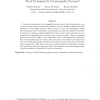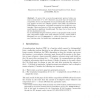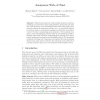42 search results - page 6 / 9 » A Cryptographically Sound Security Proof of the Needham-Schr... |
LICS
1999
IEEE
13 years 12 months ago
1999
IEEE
Contextual equivalences for cryptographic process calculi, like the spi-calculus, can be used to reason about correctness of protocols, but their definition suffers from quantific...
CCS
2008
ACM
13 years 9 months ago
2008
ACM
The Unified Model (UM) key agreement protocol is an efficient Diffie-Hellman scheme that has been included in many cryptographic standards, most recently in the NIST SP 80056A sta...
EUROCRYPT
2006
Springer
13 years 11 months ago
2006
Springer
To prove that a secure key-agreement protocol exists one must at least show P = NP. Moreover any proof that the sequential composition of two non-adaptively secure pseudorandom fun...
PET
2010
Springer
13 years 11 months ago
2010
Springer
Abstract. Webs of trust constitute a decentralized infrastructure for establishing the authenticity of the binding between public keys and users and, more generally, trust relation...
TCC
2004
Springer
14 years 28 days ago
2004
Springer
Abstract. We present a general method to prove security properties of cryptographic protocols against active adversaries, when the messages exchanged by the honest parties are arbi...



